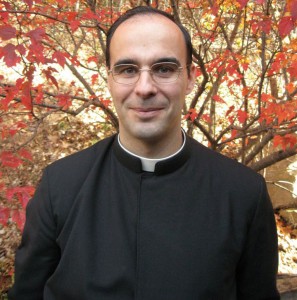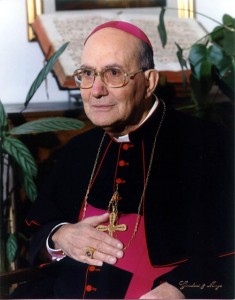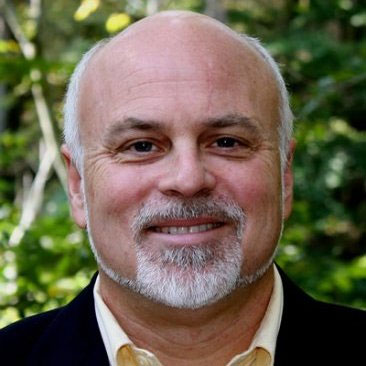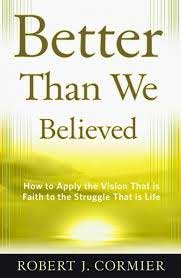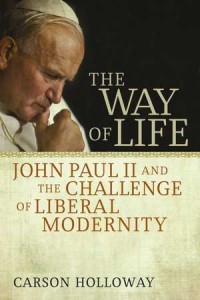FG#16- The Way of Trust and Love Ep4 – Fountains of Grace: reflections on contemporary spiritual classics with Donna Garrett Join host Donna Garrett, with Fr. James Perez, LC, as they discuss the spiritual classic “The Way of Trust and Love: A Retreat Guided By St. Therese of Lisieux” by Fr. Jacques Philippe. [powerpress] Discussed in this episode, among other topics, from “The Way of Trust and Love”
Join host Donna Garrett, with Fr. James Perez, LC, as they discuss the spiritual classic “The Way of Trust and Love: A Retreat Guided By St. Therese of Lisieux” by Fr. Jacques Philippe. [powerpress] Discussed in this episode, among other topics, from “The Way of Trust and Love”
When a person is faithful to his or her times of prayer, day after day, week after week, it’s like someone with a well in the garden that’s choked with rubbish— branches, leaves, stones, mud— but underneath is water, clean and pure . In spending time in prayer, you’re setting to work patiently to unblock the well. What comes up at the start is the mud and dirt: our wretchedness, worries, fears, guilt, self-blame— the things we normally avoid. Plenty of people run away from themselves. There’s a real fear of silence today! But those who have the courage to go forward into the desert end up finding an oasis.
Let’s stay with the image of the well. We start digging, and at first it’s not very pleasant, because we come face-to-face with our limitations and human deficiencies. But if we persevere, we’ll end by finding the wellspring. We discover, to our joy, that at the bottom of our hearts flows a pure spring of water, the presence of God dwelling within us. Even if we are poor sinners, by going to the depths of our hearts in prayer we find pure, clear water. But only prayer grants us access to the bottom of our hearts.
Philippe, Jacques (2012-06-07). The Way of Trust and Love – A Retreat Guided by St. Therese of Lisieux (Kindle Locations 987-996). Scepter Publishers. Kindle Edition.
For other episodes in the this series click here “Fountains of Grace w/Donna Garrett“
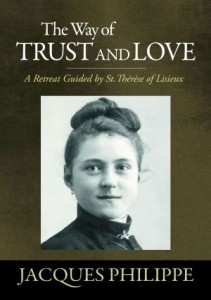 You can find “The Way of Trust and Love” here
You can find “The Way of Trust and Love” here
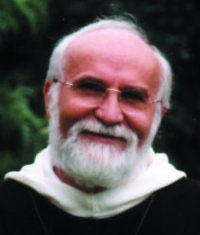
Fr. Jacques Philippe
Tags: catholic, catholic podcast, catholic prayer, cathollc spirituality
This entry was posted on Tuesday, May 20th, 2014 at 10:21 am
You can follow any responses to this entry through the RSS 2.0 feed.
“Peace I leave with you; my peace I give to youâ€
[powerpress]
an excerpt from today’s reflection by Don Schwager: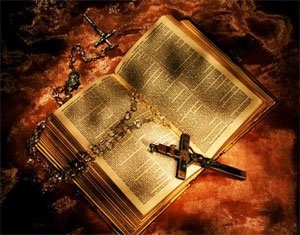
Jesus speaks to his disciples about his destination. He is going back to the Father (John 14:28). If his disciples truly love him for who he is – the only begotten Son of the Father, then they will rejoice that Jesus will be reunited with his Father in heaven. Jesus also speaks of his struggle – his passion, suffering and death on the cross. Jesus calls Satan the “ruler of this world” (John 14:30) who seeks to thwart God’s plan and to destroy God’s anointed one. In the eyes of the world the cross stood for shame, humiliation, and defeat. Jesus went to the cross knowing that it would lead to victory over the powers of sin, Satan, and death. Jesus overcame Satan through his obedience and love for his Father. The cross brought glory to Jesus and to the Father and it is our way to glory as well. In the Cross of Christ we find true peace and reconciliation with God. Do you live in the peace of Jesus Christ?
“Lord Jesus, may your peace be always with me. May no circumstance, trouble, or vexation rob me of the peace which passes all understanding. You, alone, O Lord, are my Peace. May I always reside in that peace by believing your word and by doing your will.â€
for the full reflection visit : Daily Reading and Meditation
Tags: catholic, catholic podcast, catholic prayer, cathollc spirituality
This entry was posted on Tuesday, May 20th, 2014 at 9:52 am
You can follow any responses to this entry through the RSS 2.0 feed.
The May 20Â reflection from Servant of God Bishop William Giaquinta:
“Why shouldn’t we in some way, in our littleness, establish a relationship of love, a heart relationship with Jesus? So many times we are cold, many times we consider Him to be far away, to be a stranger, and so sometimes the expressions of the saints seem to us sugary, exaggerated…Holiness is not a thought; it is not a reasoning; it is not a syllogism; it is not a search. Holiness is love. ”
For more reflections from Servant of God Bishop Giaquinta and the Pro Sanctity Movement visit: Our “Journey to Holiness” page
For more information about “The Pro Sanctity Movement” visit here
Tags: Bishop Giaquinta, catholic, catholic podcast, catholic prayer, cathollc spirituality, God Bishop Giaquinta, Pro Sanctity Movement, Servant of God Bishop William Giaquinta
This entry was posted on Tuesday, May 20th, 2014 at 9:50 am
You can follow any responses to this entry through the RSS 2.0 feed.
David Scott is one of the finest Catholic authors of our time.  He can catechize from the heart like few I have ever read and the case is no different  in what he offers with “The Love That Made Mother Teresa“.  More than just another biography on the life of this great woman, David offers insightful spiritual reflections on different events she encountered during her extraordinary life.  If we are open to those lessons,  her response to those moments can aid Christ in transforming our lives today.  In his hands her story truly becomes a witness to “Love”.  I’ve read many, many books on the life of Blessed Teresa of Calcutta, this is my favorite.
[powerpress]
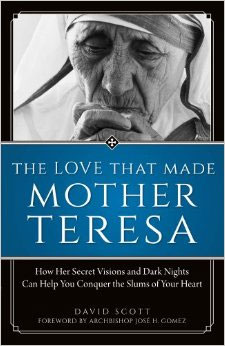 You can find the book here
You can find the book here
“This book, more than any other, shows us the saint and her significance. It belongs in the hands of everyone who loves this most beloved of modern women.” —Dr. Scott Hahn
“This book reminds us as Mother Teresa always did that God calls all of us to holiness, to be saints.” —José H. Gomez, Archbishop of Los Angeles
Tags: catholic, catholic podcast, catholic prayer, cathollc spirituality
This entry was posted on Monday, May 19th, 2014 at 2:59 pm
You can follow any responses to this entry through the RSS 2.0 feed.
Episode 8 The Daily Prayer of Discernment: The Ignatian Wisdom of the Examen Prayer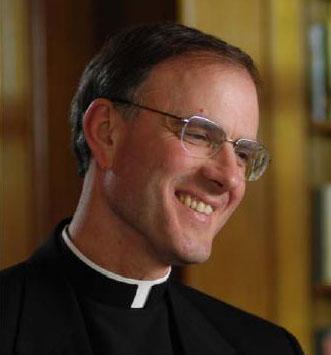 with Fr. Timothy Gallagher.
with Fr. Timothy Gallagher.
Fr. Gallagher, in this concluding episode, reviews the different dimensions of the Examen prayer and applications for our lives. Â
[powerpress]
As outlined from the Spiritual Exercises of St. Ignatius of Loyola
(translated from the autograph by Fr. E. Mullan, S.J. Â 1909Â in the public domain)
METHOD FOR MAKING THE GENERAL EXAMEN
It contains in it five Points.First Point. The first Point is to give thanks to God our Lord for the benefits received.
Second Point. The second, to ask grace to know our sins and cast them out.
Third Point. The third, to ask account of our soul from the hour that we rose up to the present Examen, hour by hour, or period by period: and first as to thoughts, and then as to words, and then as to acts, in the same order as was mentioned in the Particular Examen.
Fourth Point. The fourth, to ask pardon of God our Lord for the faults.
Fifth Point. The fifth, to purpose amendment with His grace.OUR FATHER.
Father Timothy M. Gallagher, O.M.V., was ordained in 1979 as a member of the Oblates of the Virgin Mary, a religious community dedicated to retreats and spiritual formation according to the Spiritual Exercises of St. Ignatius. Â Fr. Gallagher is featured on the EWTN series “Living the Discerning Life: Â The Spiritual Teachings of St. Ignatius of Loyola”. Â For more information on books and audio available for purchase from Fr. Timothy Gallagher check out his website: www.frtimothygallagher.org
For the other episodes in this series check out
Fr. Timothy Gallagher’s “Discerning Hearts†page
Tags: catholic, catholic podcast, catholic prayer, cathollc spirituality, Father Timothy M. Gallagher, Timothy Gallagher
This entry was posted on Monday, May 19th, 2014 at 1:53 pm
You can follow any responses to this entry through the RSS 2.0 feed.
The May 19 reflection from Servant of God Bishop William Giaquinta:
“There are people who are in love with the Eucharist and who put the Eucharist at the center of their lives; Holy Communion is the fundamental moment of the day and a basic aspect of their spirituality. A modest question might be posed to some of them. Why, after eating so much Eucharistic Bread, they are still not holy? If the Eucharistic Jesus transforms us into Himself – Who is purity, love, goodness, and self-giving to the brothers— why after so many Communions and even immediately after receiving Communion, why do other tendencies still arise in us?”
For more reflections from Servant of God Bishop Giaquinta and the Pro Sanctity Movement visit: Our “Journey to Holiness” page
For more information about “The Pro Sanctity Movement” visit here
Tags: Bishop Giaquinta, catholic, catholic podcast, catholic prayer, cathollc spirituality, God Bishop Giaquinta, Pro Sanctity Movement, Servant of God Bishop William Giaquinta
This entry was posted on Monday, May 19th, 2014 at 1:12 pm
You can follow any responses to this entry through the RSS 2.0 feed.
Show 3 ” Building a Kingdom of Love” – “The Gift of Nothing“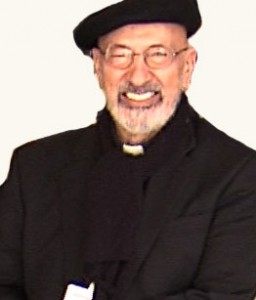
Msgr. Esseff begins by reading a passage from the book “The Gift of Nothing” by Patrick McDonnell.  He discusses how we all think what we will need “something”, but Msgr. helps us to see what God desires for us to see “the gift of nothing”.  What we desire deep down is intimacy.  Msgr. Esseff offers how Jesus reaches out to us in Divine Love…the Bread of Life.  The Eucharist offers  intimacy, will we accept the gift?
[powerpress]
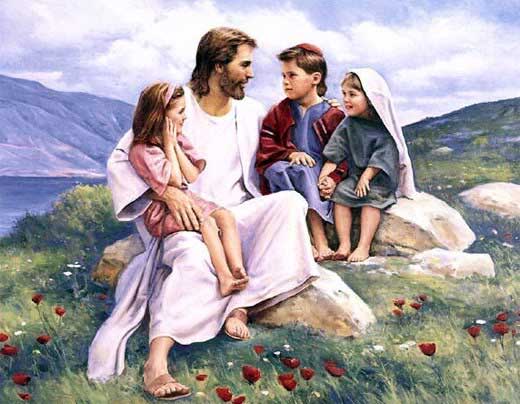
Msgr. John A. Esseff is a Roman Catholic priest in the Diocese of Scranton. He was ordained on May 30th 1953, by the late Bishop William J. Hafey, D.D. at St. Peter’s Cathedral in Scranton, PA. Msgr. Esseff served a retreat director and confessor to Blessed Mother Teresa.   He continues to offer direction and retreats for the sisters of the missionaries of charity around the world. Msgr. Esseff encountered St.  Padre Pio,  who would become a spiritual father to him. He has lived in areas around the world,  serving  in the Pontifical missions, a Catholic organization established by Bl. Pope John Paul II to bring the Good News to the world especially to the poor. Msgr. Esseff assisted the founders of the Institute for Priestly Formation and continues to serve as a spiritual director for the Institute. He continues to  serve as a retreat leader and director to bishops, priests and sisters and seminarians and other religious leaders around the world. Â
To obtain a copy of Msgr. Esseff’s book byvisiting here
Be sure to visit Msgr. Esseff’s website “Building a Kingdom of  Love”
Tags: catholic, catholic podcast, catholic prayer, cathollc spirituality
This entry was posted on Monday, May 19th, 2014 at 10:01 am
You can follow any responses to this entry through the RSS 2.0 feed.
“”If you love me, keep my wordâ€
[powerpress]
an excerpt from today’s reflection by Don Schwager: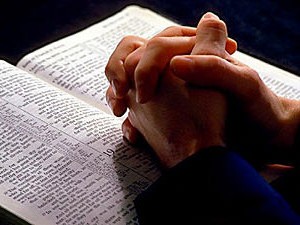
Do you know the love that surpasses all, that is stronger than death itself (Song of Songs 8:6)? In Jesus’ last supper discourse he speaks of the love he has for his disciples and of his Father’s love. He prepares his disciples for his imminent departure to return to his Father by exhorting them to prove their love for him through their loyalty and obedience to his word. He promises them the abiding instruction and consolation of the Holy Spirit.
Saint Augustine says the Lord loves each of us as if there were only one of us to love. God’s love for each of us is as real and tangible as the love of a mother for her child and the love of a lover who gives all for his beloved. God made us in love for love – to know him personally and to grow in the knowledge of his great love for us and to love him in return.
How can we know and be assured of the love of God? The Holy Spirit helps us to grow in the knowledge of God and his great love. The Spirit enables us to experience the love of God and to be assured of the Lord’s abiding presence with us (see Romans 8:35-39).
The Holy Spirit also opens our ears to hear and understand the word of God. Do you listen attentively to God’s word and believe it? Ask the Holy Spirit to inflame your heart with the love of God and his word.
“Lord Jesus, in love you created me and you drew me to yourself. May I never lose sight of you nor forget your steadfast love and faithfulness. And may I daily dwell upon your word and give you praise in the sanctuary of my heart, You who are my All.”
for the full reflection visit : Daily Reading and Meditation
Tags: catholic, catholic podcast, catholic prayer, cathollc spirituality, don schwager, holy spirit, Lord Jesus, saint augustine
This entry was posted on Monday, May 19th, 2014 at 5:52 am
You can follow any responses to this entry through the RSS 2.0 feed.
THE WAY OF PERFECTION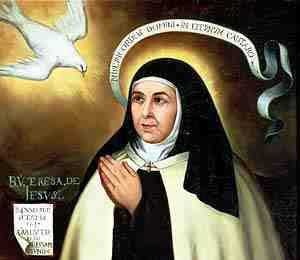
By
St. Teresa of Avila
Chapter 23
[powerpress]
For the pdf containing the complete text and footnotes click here
Describes the importance of not turning back when one has set out upon the way of prayer. Repeats how necessary it is to be resolute.
For other audio chapters of
“The Way of Perfection”
THE WAY OF PERFECTION
by
ST. TERESA OF AVILA
Translated & Edited by
E. ALLISON PEERS
from the Critical Editon of
P. SILVERIO DE SANTA TERESA, C.D.
Tags: catholic, catholic podcast, catholic prayer, cathollc spirituality, st. teresa of avila, The Way of Perfection
This entry was posted on Saturday, May 17th, 2014 at 5:46 pm
You can follow any responses to this entry through the RSS 2.0 feed.
It was rich blessing to have the opportunity to talk Fr. Robert Cormier about his book “Better Than We Believed:  How to Apply the 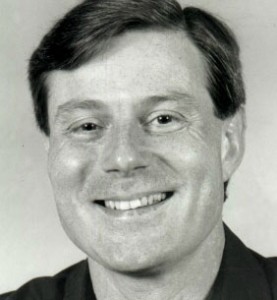 Vision That Is Faith to the Struggle That Is Life”.  With an incredible witness in ministry Fr. Bob, as he prefers to be called, has served a parish priest for many years, as well as  prison chaplain and a rehab counselor. For the last eighteen years he has been president of Project Live—a leading institution for the care of the mentally ill.  He also spent summers in mission work in  Guatemala and other areas of Central America.  This varied background serves him well as he addresses many of the the areas which challenge many people when it comes to “faith”.  What is faith?  And how do I live it out?  Especially when afraid or challenged, how can I draw on faith for strength to live the life that we were meant for? This books is an excellent resource and wonderful source of inspiration.
Vision That Is Faith to the Struggle That Is Life”.  With an incredible witness in ministry Fr. Bob, as he prefers to be called, has served a parish priest for many years, as well as  prison chaplain and a rehab counselor. For the last eighteen years he has been president of Project Live—a leading institution for the care of the mentally ill.  He also spent summers in mission work in  Guatemala and other areas of Central America.  This varied background serves him well as he addresses many of the the areas which challenge many people when it comes to “faith”.  What is faith?  And how do I live it out?  Especially when afraid or challenged, how can I draw on faith for strength to live the life that we were meant for? This books is an excellent resource and wonderful source of inspiration.
(Special note:; On May 13, Fr. Bob died in a climbing accident on Mount Hood in Oregon, after reaching the summit. He was 57 years old. Eternal rest grant unto him, O Lord, and let perpetual light shine upon him. May the soul of Fr. Bob, through the mercy of God, rest in peace. Amen.)
[powerpress]
You can find the book here
Here is a link to Faith Kit, the website Fr. Bob mentions during our conversation www.faithkit.org
Presuming nothing that both traditional believers and critical-thinking searchers will not find in their hearts, Better Than We Believed presents a strikingly clear concept of faith that answers the unhappiness of people you will recognize:MARK, who struggles with angerIRENE, who battles stressHENRY, who is consumed by hatredGLORIA, who has been betrayedBRIAN, who suffers depressionMARY, who feels trapped by her duty to a loved oneJOY, who can’t get over a loved one’s death, andJAMES, who knows that he is dyingAs we witness this faith applied to these and other serious struggles, we will see how it can transform our own experience, and offer us peace, purpose, and joy.
Tags: catholic, catholic podcast, catholic prayer, cathollc spirituality
This entry was posted on Friday, May 16th, 2014 at 3:22 pm
You can follow any responses to this entry through the RSS 2.0 feed.
BTP#36 – The Prayer of St. John Paul IIÂ – The Mystery of Faith in the Wisdom of the Saints.
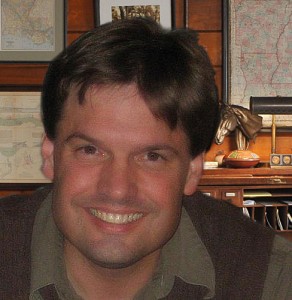 [powerpress]
[powerpress]
In this episode Dr. Lilles discusses The Prayer of St. John Paul II. He reflects on “Sign of Contradiction” The Lenten Retreat reached in 1976 by Karol Cardinal Wojtyla to Pope Paul VI and the papal household.
 Dr.Anthony Lilles is a Catholic husband and father of three teaching Spiritual Theology at St. John Vianney Theological Seminary. He teaches spiritual theology and spiritual direction to transitional deacons, and the spiritual classics to the men who enter the Spirituality Year, a year of prayer in preparation for seminary formation. He is the author of the “Beginning to Pray” Catholic blog spot. For other episodes in the series visit the Discerning Hearts page for Dr. Anthony Lilles
Dr.Anthony Lilles is a Catholic husband and father of three teaching Spiritual Theology at St. John Vianney Theological Seminary. He teaches spiritual theology and spiritual direction to transitional deacons, and the spiritual classics to the men who enter the Spirituality Year, a year of prayer in preparation for seminary formation. He is the author of the “Beginning to Pray” Catholic blog spot. For other episodes in the series visit the Discerning Hearts page for Dr. Anthony Lilles
Tags: Anthony Lilles, catholic, catholic podcast, catholic prayer, cathollc spirituality, Karol Cardinal Wojtyla, pope paul vi, St. John Vianney Theological Seminary
This entry was posted on Friday, May 16th, 2014 at 1:56 pm
You can follow any responses to this entry through the RSS 2.0 feed.
WOL5 – Episode 5-  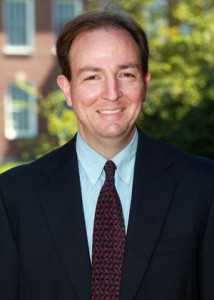 The  “Declaration of Independence” and American political philosophy and what it involves.  What is the “natural law” and how it applies to political thought.  There are principals of political “rights and wrongs” and these are the foundations for political practice (which are not always followed by the human person).  What are the “self-evident” truths?  What are “natural rights”?  Why did this system of thought survive given the American experience compared to the results of the French revolution and its theories?  Both might be “children” of the Enlightenment, but one was hostile to Christianity, the other embraced it. [powerpress]
The  “Declaration of Independence” and American political philosophy and what it involves.  What is the “natural law” and how it applies to political thought.  There are principals of political “rights and wrongs” and these are the foundations for political practice (which are not always followed by the human person).  What are the “self-evident” truths?  What are “natural rights”?  Why did this system of thought survive given the American experience compared to the results of the French revolution and its theories?  Both might be “children” of the Enlightenment, but one was hostile to Christianity, the other embraced it. [powerpress] 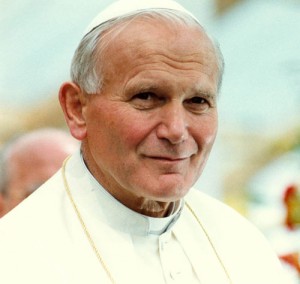
The Way of Life, Carson Holloway examines the fundamental philosophers of modernity-from Hobbes to Toqueville-to suggest that St. John Paul II’s critique of modernity is intended not to reject, but to improve. Thus, claims Holloway, it is appropriate for liberal modernity to attend to the Pope’s thought, receiving it not as the attack of an enemy but as the criticism of a candid friend.
  For other episodes in the series visit Dr. Holloway’s Discerning Hearts page
This series is based on Dr. Holloway’s book “The Way of Life”
Tags: catholic, catholic podcast, catholic prayer, cathollc spirituality
This entry was posted on Friday, May 16th, 2014 at 10:46 am
You can follow any responses to this entry through the RSS 2.0 feed.
Dr. Matthew Bunson discusses the life, times and teachings of St. John Chrysostom pt 1
-
Born: 347 AD, Antioch, Turkey
-
Died: September 14, 407 AD, Comana Pontica
  - Homilies on the Gospel of St. MatthewÂ
  - Homilies on ActsÂ
  - Homilies on RomansÂ
  - Homilies on First CorinthiansÂ
  - Homilies on Second CorinthiansÂ
  - Homilies on EphesiansÂ
  - Homilies on PhilippiansÂ
  - Homilies on ColossiansÂ
  - Homilies on First ThessaloniansÂ
  - Homilies on Second ThessaloniansÂ
  - Homilies on First TimothyÂ
  - Homilies on Second TimothyÂ
  - Homilies on TitusÂ
  - Homilies on PhilemonÂ
  - Commentary on GalatiansÂ
  - Homilies on the Gospel of JohnÂ
  - Homilies on the Epistle to the HebrewsÂ
  - Homilies on the StatuesÂ
  - No One Can Harm the Man Who Does Not Injure HimselfÂ
  - Two Letters to Theodore After His FallÂ
  - Letter to a Young WidowÂ
  - Homily on St. IgnatiusÂ
  - Homily on St. BabylasÂ
  - Homily Concerning “Lowliness of Mind”Â
  - Instructions to CatechumensÂ
  - Three Homilies on the Power of SatanÂ
  - Homily on the Passage “Father, if it be possible . . .”Â
  - Homily on the Paralytic Lowered Through the RoofÂ
  - Homily on the Passage “If your enemy hunger, feed him.”Â
  - Homily Against Publishing the Errors of the BrethrenÂ
  - First Homily on EutropiusÂ
  - Second Homily on Eutropius (After His Captivity)Â
  - Four Letters to OlympiasÂ
  - Letter to Some Priests of AntiochÂ
  - Correspondence with Pope Innocent IÂ
  - On the Priesthood
From Vatican.va, an excerpt from the teachings of Pope Benedict XVI General Audience 2009 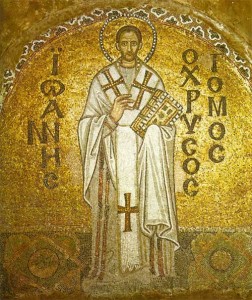
Dear Brothers and Sisters,
This year is the 16th centenary of St John Chrysostom’s death (407-2007). It can be said that John of Antioch, nicknamed “Chrysostom”, that is, “golden-mouthed”, because of his eloquence, is also still alive today because of his works. An anonymous copyist left in writing that “they cross the whole globe like flashes of lightening”.
Chrysostom’s writings also enable us, as they did the faithful of his time whom his frequent exiles deprived of his presence, to live with his books, despite his absence. This is what he himself suggested in a letter when he was in exile (To Olympias, Letter 8, 45).
He was born in about the year 349 A.D. in Antioch, Syria (today Antakya in Southern Turkey). He carried out his priestly ministry there for about 11 years, until 397, when, appointed Bishop of Constantinople, he exercised his episcopal ministry in the capital of the Empire prior to his two exiles, which succeeded one close upon the other – in 403 and 407. Let us limit ourselves today to examining the years Chrysostom spent in Antioch.
He lost his father at a tender age and lived with Anthusa, his mother, who instilled in him exquisite human sensitivity and a deep Christian faith.
After completing his elementary and advanced studies crowned by courses in philosophy and rhetoric, he had as his teacher, Libanius, a pagan and the most famous rhetorician of that time. At his school John became the greatest orator of late Greek antiquity.
He was baptized in 368 and trained for the ecclesiastical life by Bishop Meletius, who instituted him as lector in 371. This event marked Chrysostom’s official entry into the ecclesiastical cursus. From 367 to 372, he attended the Asceterius, a sort of seminary in Antioch, together with a group of young men, some of whom later became Bishops, under the guidance of the exegete Diodore of Tarsus, who initiated John into the literal and grammatical exegesis characteristic of Antiochean tradition.
He then withdrew for four years to the hermits on the neighbouring Mount Silpius. He extended his retreat for a further two years, living alone in a cave under the guidance of an “old hermit”. In that period, he dedicated himself unreservedly to meditating on “the laws of Christ”, the Gospels and especially the Letters of Paul. Having fallen ill, he found it impossible to care for himself unaided, and therefore had to return to the Christian community in Antioch (cf. Palladius, Dialogue on the Life of St John Chrysostom, 5).
For more visit Vatican.va
Dr. Matthew Bunson, Senior Fellow of the St. Paul Center for Biblical Theology, is one of the United States’ leading authorities on the papacy and the Church.
His books include: The Encyclopedia of Catholic History; The Encyclopedia of Saints; Papal Wisdom; All Shall Be Well; Encyclopedia of the Roman Empire; and The Angelic Doctor: The Life and World of St. Thomas Aquinas; The Pope Encyclopedia; We Have a Pope! Benedict XVI, the first Catholic biography of the Holy Father in the English language; the Encyclopedia of U.S. Catholic History; Pope Francis. His also the editor of OSV’s “The Catholic Answer” magazine.
Tags: catholic, catholic podcast, catholic prayer, cathollc spirituality, John Chrysostom, matthew bunson, st john chrysostom
This entry was posted on Friday, May 16th, 2014 at 8:21 am
You can follow any responses to this entry through the RSS 2.0 feed.
“Do not let your hearts be troubled!†[powerpress] an excerpt from today’s reflection by Don Schwager: Do you allow any troubles to rob you of God’s peace? As much as we try to avoid it, we all inevitably encounter trouble and difficulties we find hard to endure. Jesus knew his disciples would have to face trials and persecution after he left them to return to his Father in heaven. Adversity can make us lose hope and become discouraged, or it can press us closer to God and to his promises. “It is the LORD who goes before you; he will be with you, he will not fail you or forsake you; do not fear or be dismayed” (Deuteronomy 31:8). Just as God went ahead of the Israelites in the wilderness to lead them safely to the promised land, Jesus tells his disciples that he is going ahead to prepare a place for them in God’s house – a place of refuge, peace, and security, and everlasting happiness. God’s house is never closed nor crowded – there is plenty of room for everyone who believes in God and in his beloved Son, the Lord Jesus Christ. The greatest fear in this present life – whether it be the separation and loss of life to a loved one or the threat to one’s own life – is put to rest by Jesus’ promise that we will live forever with him and the Father in their heavenly home with a great company of saints and angels who will be our friends forever as well. Do you know the way to the Father’s house? Jesus expected his disciples to know where he was going and what their ultimate destination would be as well. Thomas, who was both a doubter and a realist, spoke for all the disciples when he said, “we neither know where you are going nor how we shall get there on our own?” If you have never been to another land or traveled down an unfamiliar road, you naturally want to know what your destination is and how to get there safe and sound. During the middle of the 15 year civil war in Lebanon, at a time when many believers had been isolated and cut off from contact with outside Christians, I attempted to find a way to visit. Since I had never traveled there before, nor spoke the language, I was helpless without a guide. Fortunately a Christian friend from Lebanon met me half-way and personally guided me safely through unfamiliar territory, including some challenging road-blocks and check-points along the way. “Lord Jesus, you fill us with the joy of your saving presence and you give us the hope of everlasting life with the Father in Heaven. Show me the Father that I may always know and glorify him.” for the full reflection visit : Daily Reading and Meditation
Do you allow any troubles to rob you of God’s peace? As much as we try to avoid it, we all inevitably encounter trouble and difficulties we find hard to endure. Jesus knew his disciples would have to face trials and persecution after he left them to return to his Father in heaven. Adversity can make us lose hope and become discouraged, or it can press us closer to God and to his promises. “It is the LORD who goes before you; he will be with you, he will not fail you or forsake you; do not fear or be dismayed” (Deuteronomy 31:8). Just as God went ahead of the Israelites in the wilderness to lead them safely to the promised land, Jesus tells his disciples that he is going ahead to prepare a place for them in God’s house – a place of refuge, peace, and security, and everlasting happiness. God’s house is never closed nor crowded – there is plenty of room for everyone who believes in God and in his beloved Son, the Lord Jesus Christ. The greatest fear in this present life – whether it be the separation and loss of life to a loved one or the threat to one’s own life – is put to rest by Jesus’ promise that we will live forever with him and the Father in their heavenly home with a great company of saints and angels who will be our friends forever as well. Do you know the way to the Father’s house? Jesus expected his disciples to know where he was going and what their ultimate destination would be as well. Thomas, who was both a doubter and a realist, spoke for all the disciples when he said, “we neither know where you are going nor how we shall get there on our own?” If you have never been to another land or traveled down an unfamiliar road, you naturally want to know what your destination is and how to get there safe and sound. During the middle of the 15 year civil war in Lebanon, at a time when many believers had been isolated and cut off from contact with outside Christians, I attempted to find a way to visit. Since I had never traveled there before, nor spoke the language, I was helpless without a guide. Fortunately a Christian friend from Lebanon met me half-way and personally guided me safely through unfamiliar territory, including some challenging road-blocks and check-points along the way. “Lord Jesus, you fill us with the joy of your saving presence and you give us the hope of everlasting life with the Father in Heaven. Show me the Father that I may always know and glorify him.” for the full reflection visit : Daily Reading and Meditation
Tags: catholic, catholic podcast, catholic prayer, cathollc spirituality, closer to God, Lord Jesus, Lord Jesus Christ
This entry was posted on Friday, May 16th, 2014 at 12:20 am
You can follow any responses to this entry through the RSS 2.0 feed.
A delight to discuss Catholic Social Teaching with Dr. Joseph Capizzi, Associate Professor of Moral Theology at the Catholic University of America. 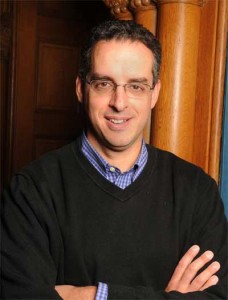  He is co-editor of a phenomenal new resource entitled “A Catechism for Business: Tough Ethical Questions and Insights from Catholic Teaching”.  A rare work which makes the complex issues of ethics,  found in our society, simple and accessible for lay faithful reflection and deeper study.  Truly, a must have, not only for thebusiness office, but for every Catholic home and parish.
 He is co-editor of a phenomenal new resource entitled “A Catechism for Business: Tough Ethical Questions and Insights from Catholic Teaching”.  A rare work which makes the complex issues of ethics,  found in our society, simple and accessible for lay faithful reflection and deeper study.  Truly, a must have, not only for thebusiness office, but for every Catholic home and parish.
[powerpress]
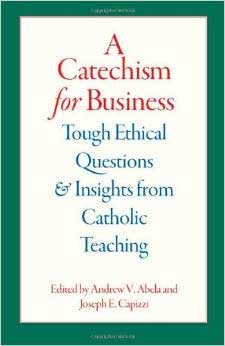 You can find the book here
You can find the book here
This is a brilliantly conceived and executed handbook. I imagine that it will be translated into many languages around the world. A Catechism for Business is the most practical handbook of Christian social teaching in relation to the vocation of persons in business ever produced.
Michael Novak, 1994 Templeton LaureateThe Church’s social teachings are a “best-kept secret” because they are often presented as answers without questions. Dr. Capizzi and Dean Abela have provided the questions, from the heart of the business enterprise, along with accurate but succinct responses from Catholic social doctrine. In their expert hands, the teaching has a chance to be heard.
Francis Cardinal George, O.M.I., Archbishop of ChicagoWork is not only a necessary activity but a beautiful expression of our creative nature, and this book is a vital resource for anyone who wishes to align work–and the workplace–according to God’s love and vision of the human person. Authors Abela and Capizzi do a great service to Christians in providing the most relevant Catholic teachings on the matters of labor, business, employment, wages, economic systems, and a myriad of related issues so relevant and so contentious in today’s world.
Carl Anderson, Supreme Knight, Knights of Columbus, and author, A Civilization of Love: What Every Catholic Can Do to Transform the World
Tags: Catechism, catholic, catholic podcast, catholic prayer, catholic social teaching, Catholic University of America, cathollc spirituality, Joseph Capizzi
This entry was posted on Thursday, May 15th, 2014 at 10:19 am
You can follow any responses to this entry through the RSS 2.0 feed.

